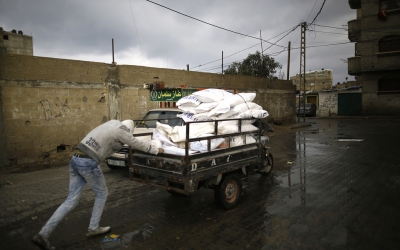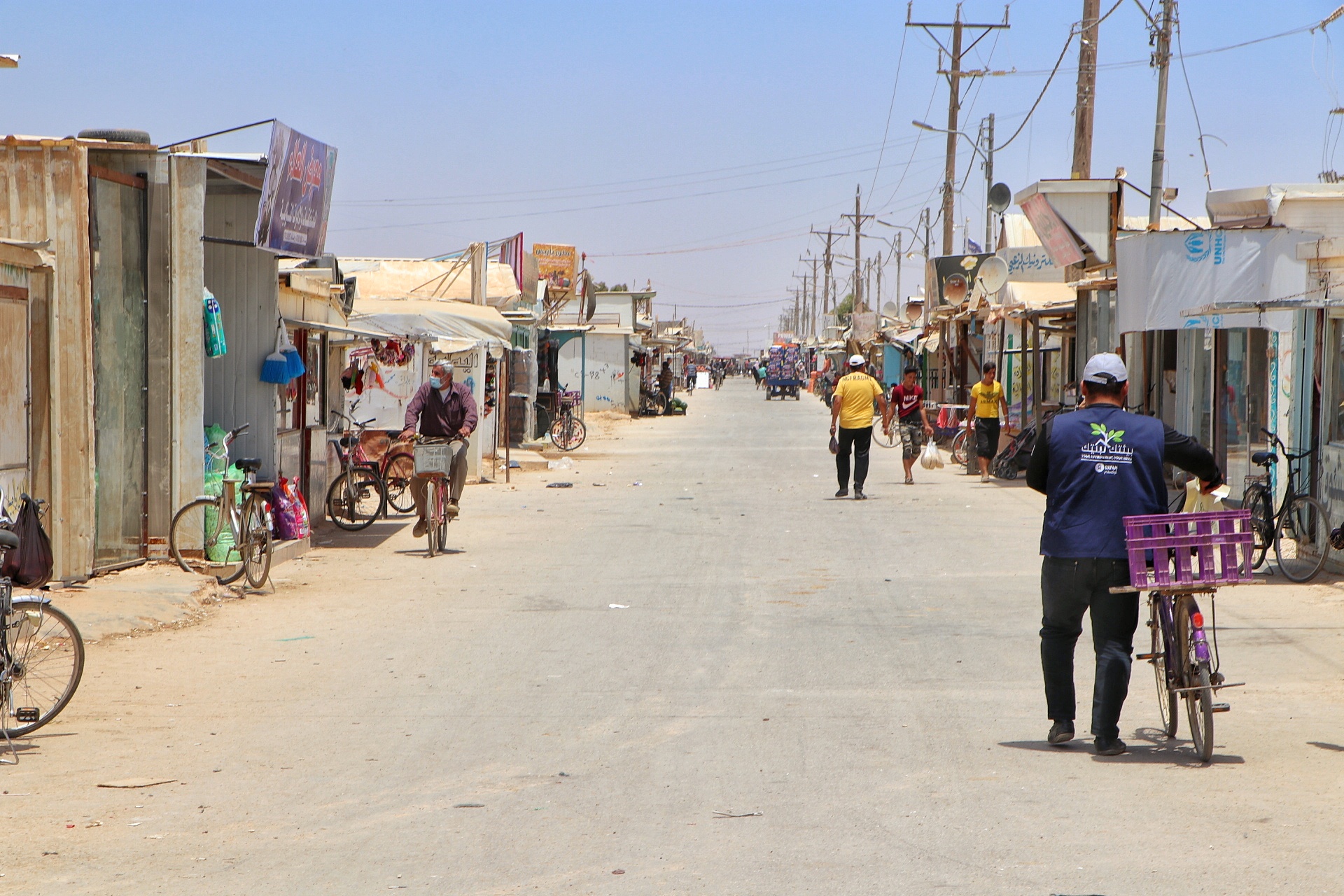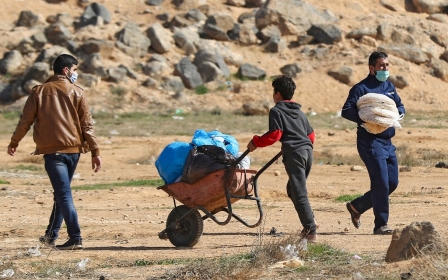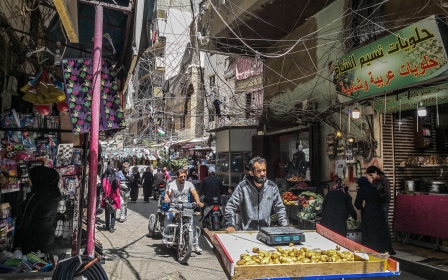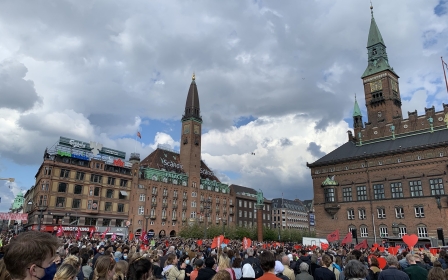Syrian refugees in Jordan contemplate return home as UN cuts aid
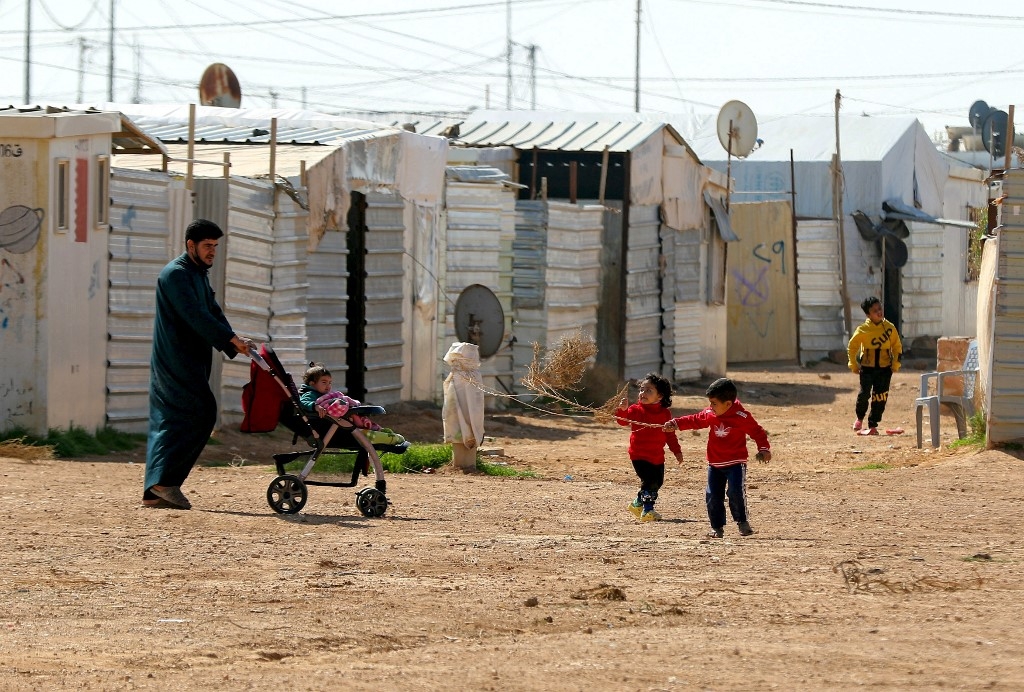
Ibrahim al-Haj anxiously checks his mobile phone hoping it will be good news about work.
He arrived in Jordan as a refugee from Syria eight years ago and took to working odd jobs to support his family.
But work has been hard to come by since the pandemic hit last year.
Ibrahim, who lives in Jordan's northern Irbid province, now relies solely on a modest cash stipend provided by the United Nations World Food Programme (WFP).
Earlier this month, however, the WFP announced that it would be ending the monthly payments to Ibrahim and thousands of Syrian refugees living in Jordan.
Many fear that without the stipend they will be unable to survive and may even be forced to return home to Syria, where a decade-long war continues and the economy is in free fall.
Desperate times
On 3 June, the WFP announced that 21,000 Syrian refugees will no longer receive their monthly food stipend from the start of July, citing budgetary constraints.
“Desperate times call for desperate measures,” said Alberto Correia Mendes, WFP representative and country director in Jordan, in a statement.
“We have to make some difficult choices to stretch the limited resources we have and ensure that we meet the needs of the most vulnerable refugees. These are families who cannot put food on the table without WFP assistance.”
WFP says it urgently needs $58m to continue food assistance until the end of the year for the half million refugees it supports.
'Desperate times call for desperate measures'
- Alberto Correia Mendes, World Food Programme
Refugees typically use ATM machines to withdraw their allotted subsidy or use electronic cards to buy food from some 200 contracted grocery stores.
For Ibrahim, his wife and three children, the $105 monthly allowance was a lifeline during the pandemic, even if it did not cover all their costs.
“I was able to ensure that our family had food while our unpaid rent of $210 per month is now three months overdue.”
After lobbying the UN for the past six years to re-evaluate his situation, Ibrahim hoped that there would be an increase in the stipend - not for it to be stopped altogether.
“Now that the cash is being stopped without an evaluation I am in total shock,” he said as he waved his card in the air.
Thinking of returning
According to Ibrahim, the severity of the cuts are such that some of Jordan’s more than 600,000 Syrian refugees are now thinking of returning home, despite the dangers.
The cuts have “added pressure on refugees to return to Syria as their options are narrowing," he said. “Our options are limited and many are now seriously considering returning to Syria."
But some suspect the timing of the WFP announcement, coming just two days after Bashar al-Assad won another term in office. “Refugees are talking about a plan to force them to return,” Ibrahim said.
'Our options are limited and many are now seriously considering returning to Syria'
- Ibrahim al-Haj, Syrian refugee
Mahmoud Ghazi, another Syrian refugee who has had his stipend cut, agrees.
“They cut the support to Syrians so as to pressure them to return to Syria,” he said. “If that is what they want they should use other means.”
Ghazi, 58, lives in the capital Amman and arrived in Jordan in 2013 from Daraa province in Syria. He is unable to work and depends on his only son who left school at the age of 16 to work.
“My wife is very sick and I am unable to work. My son does work but what he makes barely covers the house rent, " he said. "The food aid was the only money I had for food and medicine for my wife."
Ghazi has appealed for a re-evaluation with the hope that he can get his monthly stipend back. “It is so difficult that we can’t take any more problems. My son's work is not steady and that barely covers our need for house rent.”
Needy families on the rise
The situation of Syrian refugees has been getting gradually worse since the outbreak of the pandemic. Work has been scarce as businesses were forced to close to stem the spread of the coronavirus.
More than two thirds of Syrian refugees have seen their income drop since the start of the pandemic, according to WFP estimates.
And the organisation estimates that a similar proportion of refugees are on the edge of food insecurity.
Additionally, according to Yasin Ateeq, a Syrian social worker, the number of needy Syrian families has increased by 50-60 percent compared to before the pandemic.
“The aid cuts will increase the problems for refugees because many of them depend almost exclusively on this aid which they had felt was permanent.”
However, Ateeq remains hopeful that donor countries will step forward to ensure the programme continues.
If that money is not forthcoming, however, the WFP has warned that things could get even worse.
“If we do not receive further contributions, we may find ourselves having to cut food assistance for another quarter of a million refugees living outside the camps by September,” said the WFP's Correia Mendes.
The statement added that food insecurity has doubled in the last year to reach 25 percent.
'We know how hard it is'
Responding to concerns that some of the most desperate families had had their stipend cut, Dara Masri, a WFP spokesperson, admitted that funding cutbacks meant that the organisation had been unable to thoroughly assess the need of refugees.
Normally refugees would normally receive aid based on an evaluation of factors, including how many family members are working, issues of protection and gender.
But Masri said: “We have not been able to make the needed visits to some half a million Syrian refugees. That is why we were forced to carry out the evaluation based on previous data we had collected.”
'There is no relationship between the cut of relations and the return to Syria issue'
- Dara Masri, World Food Programme
She added that families were able to appeal the decision online via Facebook.
Masri also denied the cuts were an attempt to push Syrians to return home.
“There is no relationship between the cut [in assistance] and the return to Syria issue," she said.
"The cut is only a result of the shortage in donor support and an effort to ensure that the very needy families are not left out.
"We in the World Food Programme are aware of the situation of Syrian refugees and we know how hard it is.”
Some 666,692 Syrian refugees are registered with the United Nations refugee agency UNHCR, of whom 128,579 live in refugee camps.
Jordanian government census data showed that 1.3 million Syrians, both registered and unregistered refugees, are living in Jordan.
Middle East Eye propose une couverture et une analyse indépendantes et incomparables du Moyen-Orient, de l’Afrique du Nord et d’autres régions du monde. Pour en savoir plus sur la reprise de ce contenu et les frais qui s’appliquent, veuillez remplir ce formulaire [en anglais]. Pour en savoir plus sur MEE, cliquez ici [en anglais].


